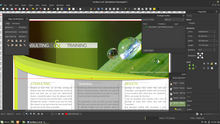Scribus
 | |
 Scribus 1.4.6 under Linux Mint 18 | |
| Developer(s) | The Scribus Team |
|---|---|
| Initial release | 26 June 2003 |
| Stable release | 1.4.6[1]
/ 11 January 2016 |
| Preview release | 1.5.2[2]
/ 17 May 2016 |
| Repository | |
| Written in | C++ (Qt) |
| Operating system | Windows, Linux/UNIX, Mac OS X, OS/2 Warp 4/eComStation, FreeBSD, PC-BSD, OpenBSD, NetBSD, Solaris, OpenIndiana, GNU/Hurd, Haiku |
| Available in | Multilingual |
| Type | Desktop publishing |
| License | GNU GPL |
| Website | scribus |
Scribus is a desktop publishing (DTP) application, released under the GNU General Public License as free software. It is based on the free Qt toolkit, with native versions available for Unix, Linux, BSD, Mac OS X, Haiku, Microsoft Windows, OS/2 and eComStation operating systems.
Scribus is designed for layout, typesetting, and preparation of files for professional-quality image-setting equipment. It can also create animated and interactive PDF presentations and forms. Example uses include writing newspapers, brochures, newsletters, posters, and books.
Books about Scribus are available in several languages,[3] including an official manual for v1.3, published through FLES Books in 2009.[4]
General feature overview
Scribus supports most major bitmap formats, including TIFF, JPEG, and Adobe Photoshop. Vector drawings can be imported or directly opened for editing. The long list of supported formats includes Encapsulated PostScript, SVG, Adobe Illustrator, and Xfig. Professional type/image-setting features include CMYK colors and ICC color management. It has a built-in scripting engine using Python. It is available in more than 24 languages.
High-level printing is achieved using its own internal level 3 PostScript driver, including support for font embedding and sub-setting with TrueType, Type 1, and OpenType fonts. The internal driver supports full Level 2 PostScript constructs and a large subset of Level 3 constructs.
PDF support includes transparency, encryption, and a large set of the PDF 1.5 specification, as well as PDF/X-3,[5] including interactive PDFs form fields, annotations, and bookmarks.
The file format, called SLA, is based on XML. Text can be imported from OpenDocument (ODT) text documents, OpenOffice.org Writer, Microsoft Word, PDB (Palm OS), and HTML formats (although some limitations apply). ODT files can typically be imported along with their paragraph styles, which are then created in Scribus. HTML tags which modify text, such as bold and italic, are supported. Word and PDB documents are only imported as plain text.
Although Scribus supports Unicode character encoding, it does not properly support complex script rendering and so cannot be used with Unicode text for languages written with Arabic, Hebrew, Indic, and South East Asian writing systems.[6][7] In August 2012, it was announced that a third party had developed a system to support complex Indic scripts.[8][9][10] In May 2015 it was announced that the ScribusCTL project had started to improve complex layout by integrating the OpenType text-shaping engine HarfBuzz into the official Scribus 1.5.1svn branch.[11] In July 2016 it was announced that the text layout engine had been rewritten from scratch in preparation for support of complex scripts coming in Scribus 1.5.3 and later.[12]
As of June 2016[update] Scribus did not have OpenType alternative glyph support, so ligatures, for example, aren't inserted automatically.[13]
The 1.6 version is expected to provide a better table implementation and support for PDF/X-1a, PDF/X-4, and PDF/E. Footnotes, marginal notes, and ePub exporting are under development.[citation needed]
Support for other programs and formats
Scribus cannot read or write the native file formats of other DTP programs such as QuarkXPress or InDesign; the developers consider that reverse engineering those file formats would be prohibitively complex and could risk legal action from the makers of those programs.[14] Support for importing Microsoft Publisher is incorporated into version 1.5,[15] and QuarkXPress Tag files, InDesign's IDML, as well as InCopy's ICML formats were added to the development branch.[16]
Due to licensing issues, the software package does not include support for the Pantone color matching system (PMS), which is included in some commercial DTP applications. Pantone colors can be obtained and incorporated within Scribus without licensing issues.[17] Scribus is shipped with more than 100 color palettes, most donated by various commercial color vendors, but also including scientific, national, and government color standards.
References
- ^ https://wiki.scribus.net/canvas/1.4.6_Release
- ^ https://wiki.scribus.net/canvas/1.5.2_Release
- ^ "Books about Scribus". Scribus wiki. Retrieved 16 June 2016.
- ^ "Scribus 1.3 Official Manual". FLES Books. 2009. Archived from the original on 6 January 2010.
- ^ "Scribus PDF/X-3 Overview". Retrieved 22 May 2011.
- ^ Scribus Metabug 3965: Support for non-latin languages
- ^ Scribus bug 1547: Support for Indic Scripts
- ^ DAKF (15 August 2012). "Indic Unicode support for Scribus is developed". scribus mailing list. Retrieved 11 October 2012.
- ^ "Complex Script Functionality". Scribus Wiki. Retrieved 11 October 2012.
- ^ "0001547: Support for Indic Scripts". Mantis Issue Tracker for Scribus. Retrieved 11 October 2012.
- ^ "ScribusCTL project started". Scribus News. Retrieved 9 December 2015.
- ^ "1.5.2 Release - Scribus Wiki". Scribus Wiki. Retrieved 22 July 2016.
- ^ Scribus bug #0001413, retrieved 2016-06-11
- ^ Why Scribus doesn't support QuarkXPress and other major publishing applications, scribus.net
- ^ Scribus 1.5.0 Release Schedule, scribus.net
- ^ "Scribus Wiki tracker of file format support".
- ^ "How to legally obtain spot colour palettes for use in Scribus 1.3.3.x and later versions"
External links
Articles
- Use dmy dates from May 2012
- Cross-platform software
- Desktop publishing software
- Desktop publishing software for Linux
- DTP for OS X
- DTP for Windows
- Free desktop publishing software
- Free educational software
- Free multilingual software
- Free PDF software
- Free software programmed in C++
- Free typesetting software
- Software that uses Cairo
- Software that uses Qt
